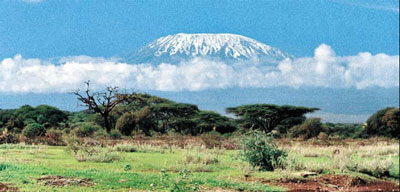Snow-capped Kilimanjaro is
Africa's tallest mountain and is located in northeastern
Tanzania.
Tanzania's ambassador to China, H.E. Omar R. Mapuri, believes
the two nations have a surprising amount in common.
"Our two countries have over all these changing times pursued
similar socio-economic policies and followed similar paths to
development, albeit at slightly different tones and paces," he
writes on the embassy's website. "Tanzania's policy of Ujamaa and
Self Reliance - a brand of African socialism tailored to suit the
realities of Tanzania - is for intent and purpose similar to the
Chinese policy of Socialism with Chinese Characteristics.
Tanzania's economic liberalization policy is akin to the Chinese
opening up policy."
The countries have enjoyed a close relationship since former
Chairman Mao Zedong "got behind the plight of the oppressed
African" during the continent's decolonization, Mapuri says.
China is the only Asian country that recognized the 1964
Zanzibar Revolution, in which the United Republic of Tanzania was
established through the union of Tanganyika and Zanzibar, shortly
after the states won independence.
And in the 1970s, China took over construction of the
Tanzania-Zambia Railway when developed countries shunned the
project.
But it's within the last few years that the countries have upped
the ante on their friendship. Bilateral trade surged by nearly 70
percent in 2005 to $470 million. During this time, the country's
exports to China increased by 150 percent to about $170 million,
while its imports from China increased 40.6 percent to $300
million.
The Forum on China-Africa Cooperation created a framework in
which China's Preferential Tariff Agreement led to the tripling of
Tanzania's exports of cotton, gold and sisal to the country.
Today, the two countries are jointly building the $56.4 million
National Stadium, according to Olympic standards, in Tanzania's
capital, Dar es Salaam.
The Tanzanian government has declared relations with China to be
of utmost importance to national development. Today, the country is
among the world's poorest, with per capita GDP at $800 (PPP), but
it has picked up the pace of development to reach 6 percent real
GDP growth in 2006.
More than 80 percent of the population lives in rural areas and
work in the agricultural sector, which accounts for nearly half of
the GDP. However, topographic and climate conditions have rendered
all but 4 percent of the land area - the greatest in East Africa -
arable.
Today, the government is jointly run by the Union Government and
the Zanzibar Revolutionary Government, and led by President Jakaya
Mrisho Kikwete.
The 120 tribes - of which five have more than 1 million people -
that make up the country's 39.38 million residents live in a
country famous for its terrain and ecosystems. Even the most
geographically inept have heard of Mount Kilimanjaro, Africa's
tallest snow-capped mountain, Lake Victoria, the world's
second-largest freshwater lake, Lake Tanganyika, the world's second
deepest lake, the Great Rift Valley and the beaches of
Zanzibar.
The country's 15 national parks, which the national government
claims contains the largest concentration of wild animals on the
continent, have long been an attraction for safari seekers -
especially the renowned Serengeti, which spills across the border
into Kenya.
(China Daily January 18, 2008)


